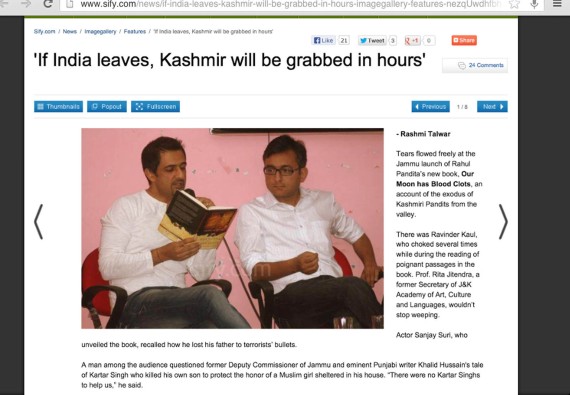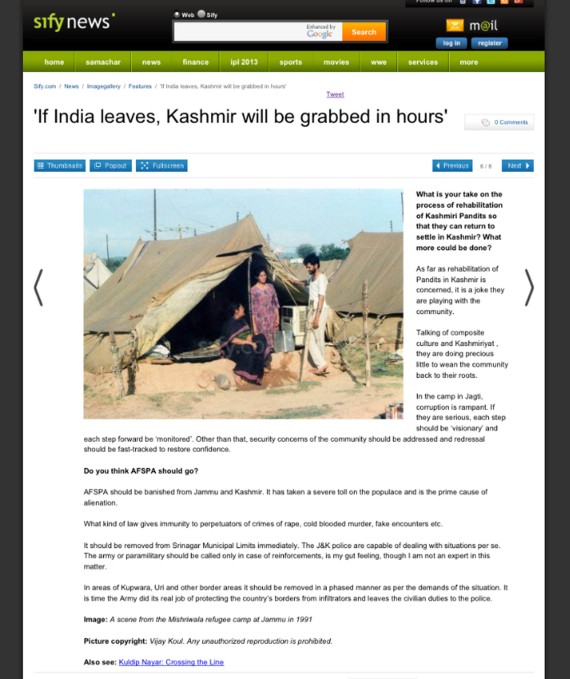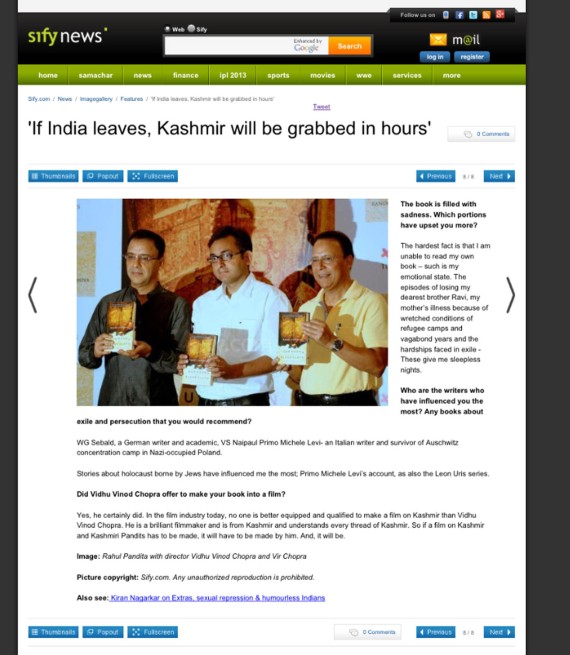‘If India leaves, Kashmir will be grabbed in hours’
By Rashmi Talwar/Sify.com
Over the years, the gurgling waters of River Chenab near Jammu-the city of temples, have become the staple for legends, folklore, separations and yearnings; of sufferings and pain and bloodbaths or as they say crossroads for lovers or symbolic of lovelores. Legendary singer Suraiya Multanikar and later Punjab’s Nightingale Surinder Kaur cooing to her beloved to cross over the banks of River Chenab for a rendezvous must surely have stirred longings in young and not-so-young hearts and is perhaps one of the most hummed Punjabi scores –
“Langh aa jaa pattan Chaana da yaar, langh aa jaa Pattan Channa da..” (Cross the shore of (river) Chenab and meet me ..O my Love! Cross the Chenab and come and meet me).

And yet another poetic great Amrita Pritam mentioned river Chenab in her heart wrenching poetry during the partition bloodbath
‘Ajj aakhaan Waris Shah nu….’:
“Uth dardmandan diaa dardiiaa uth tak apna Punjaab!
Aj bele laashaan vichiiaan te lahuu dii bharii Chenaab!
Kise ne panja paanian vich dittii zehar rala!
Te unhaan paaniaan dharat nuun dittaa paanii laa!
(O friend of the suffering, Rise and see your Punjab!
Corpses strewn on pastures, Blood runs in the Chenab.
Someone had poisoned our five rivers
And turned the poisoned waters to our land.)
And just like the pain of partition of 1947, the brunt of which was borne by Punjab and Jammu & Kashmir, the topography of J&K through which Chenab flows, saw yet another upheaval in 1990, just like Punjab in the 80s.
Yet another, grieving lot, of forced exile, of a kick, of a push, of betrayals galore. The waters of Chenab and another river Jhelum from Kashmir, into which Chenab eventually flows, seemed sullied and poisoned once again, and its moon had blood clots! Yes! RAHUL PANDITA, who bared the saga of exodus of hapless Kashmiri Pandits out on the cold, dark, path to nowhere, spoke to RASHMI TALWAR in Jammu- the land where blood flowed like rivers, after the launch of his book ‘Our Moon has blood clots’ in an exclusive, bare all talk.
During the book launch, many in the audience and amongst the distinguished readers, let their tears flow freely. There was Ravinder Kaul, who choked on his tears several times during the reading of poignant passages in the book. A grey haired lady, Prof. Rita Jitendra’s tears rolled unabashedly, she is a former Secretary of J&K Academy of Art, Culture and Languages. Noted Actor Sanjay Suri who unveiled the book and recalled how he lost his father to terrorists’ bullets. There was also one who questioned a former Deputy Commissioner of Jammu and eminent Punjabi writer Khalid Hussain’s tale of one Kartar Singh who killed his own son to protect the honor of a Muslim girl sheltered in his house. “There were no Kartar Singhs for us, to hold our hands!” mourned the largely Kashmiri Pandit audience, sitting alongside some learned Kashmiri Muslims who braved to face the accusations of betrayal, by their majority community, that lead to the ouster and exodus of Kashmiri Pandits from their hearths and homes, to empty roads leading nowhere.
Khalid was perhaps the only one who accepted –“Haan! mein Gunehgar hoon!”. (Yes! I am guilty!) on behalf of few of his community, who indeed indulged in games, most foul. The book’s unveiling organized by publishers -Random House, represented by Rukun Kaul, most ironically took place in one of the most unlikeliest of places i.e. the Urdu Department’s seminar hall, of Jammu University.
EXCERPTS FROM THE INTERVIEW
Why did you write Our Moon has Blood Clots? Did you hope that chronicling the account of the Pandit exodus would help get the trauma off your chest? Do you hope the book will force people to do something to lessen the sufferings of the community?
The main aim for writing this book is to set the record straight on the events of 1990; the book is aimed at arriving at a true picture of the conflict of Kashmir. The story of the Kashmiri Pandits and the kind of brutalization they faced in the Valley has hardly been mentioned as a part of the ‘Kashmir discourse’. So my book is an act of defiance, like one of the reviews of my book stated.
My book is for anyone who is on the side of truth. It is also a tribute to the grit of my community that has suffered religious persecution for centuries and has survived the onslaught bravely.

Why did you wait so long to write this book?
This is the first book I ever wanted to write. And every time I visited Kashmir, that resolve only strengthened. In the past few years, the anger at how our story has been ignored has only risen.
But this book is not a result of that anger. This book is a result of helplessness arising out of that anger.
What were your feelings about visiting home for the first time after you decided to write the book? How much did the lies and truth you heard disturb you, every time you visited Kashmir?
It was traumatic to visit my home, despite the fact that I had been regularly coming to Kashmir. It was only in the year 2007 that I could muster the courage to visit home. The lies and truths are all there and so, it’s been a difficult book and took so much time to write. Also, I was not sure what form this story should take. I was also aware that this story can’t be told again and again; that I’ll get only one chance to tell this. That is why it took time.
Image: A scene from the Mishriwala refugee camp at Jammu in 1991
Picture copyright: Vijay Koul. Any unauthorized reproduction is prohibited.
What has the response from Kashmir been to your book?
The response from Kashmir has been on predictable lines. Since 1990, there has been an orchestrated effort to wash off their hands from the ethnic cleansing of the Pandits in which many among the Muslim majority took part.
The Kashmiris from the majority community have written so many scathing reviews of my book. But not one of them has challenged the core of my book – that in 1989-90, 350,000 Kashmiri Pandits were rendered homeless and hundreds of them killed, raped, and maimed on the streets and inside their homes.
The truth, you see, is like the sun. It blinds you when you look at it. You should have the moral courage to look at it. Those who deny us our truth lack the moral courage
How do you perceive the ground situation in Kashmir today? What are your feelings about the calls for ‘Azadi’, which are still on? Do you think demanding Independence is just a front for joining Pakistan?
If Kashmir was to be declared Independent today, it would not be able to survive its independent status even for 24 hours! It would be gulped in no time by countries surrounding it.
Moreover there is no vision in the slogan of ‘Azadi’ or independence of Kashmir. Did Kashmiris ever have a dialogue as to what Independence for Kashmir would encompass? For instance, would independence also mean the freedom and consolidation of areas occupied by China and Pakistan?
Even in PoK there is no ‘Azadi’ or independence visible. In many ways the calls for independence are a front for joining Pakistan, in my view. The calls are made to break the shackles of being ruled.
Image: A 1998 file picture shows bodies of Kashmiri Hindus killed by unidentified gunmen in Wanhama village of Ganderbal town on the night of January 26. 23 Hindus, including nine women and four children, fell victim to indiscriminate firing of three killers.
Picture copyright: AFP. Any unauthorized reproduction is prohibited.

In your view, what is the best way forward for Kashmir? What if India gave up on Kashmir?
As a Kashmiri and a non political entity, the best future Kashmir can have is only with India, even if India is riddled with so many problems of its own, especially corruption. This is owing to India’s multiculturalism, and secular dynamic makeup.
In India, people are seen to be moving forward and not bound by rituals, religion and faith factors from dawn to dusk. Kashmir would be grabbed in minutes if not hours, were India to give up on Kashmir!
Do you feel that people like Syed Ali Shah Geelani, Yasin Mallik and other separatists. who have recently been calling Kashmiri Pandits their brothers and talk about their ‘anxious wait’ for the KPs’ return to Kashmir, mean well? Or is all this just a political stunt?
It is a complete political stunt. A handful of Kashmiri Pandits who stayed back in Kashmir despite the turmoil are now being used as ‘showpieces’ by these hardliners who have changed their tunes and are now calling upon them. Where were they when stories trickled out, about betrayal and treachery by their own brethren?
The Kashmiri Muslims had whispered these stories amongst themselves in gatherings, but never have they accepted them. It is merely a political lip service, nothing more.
Image: A scene from the Mishriwala refugee camp at Jammu in 1991
Picture copyright: Vijay Koul. Any unauthorized reproduction is prohibited.
What was your view on Basharat Peer’s book Curfewed Nights?
There have been innumerable narratives by Kashmiri Muslims about their lives during the turmoil, but very few from the Pandits. Basharat wrote his own story and I wrote mine. .
Many Kashmiri Muslims seem to feel perturbed about the incidents you mention in your book. Many are known to come to ‘Kheer Bhawani’ shrine when Pandits visit the place during ‘Jyeshtha Ashtami’, urging them to return. Do you equate them with the property dealers in your book who use these tactics for ulterior motives?
Everyone knows what happened. The bigger betrayal is the denial.
The man hiding in the half-filled rice drum was not killed by militant’s bullets but by the neighbour who gave away his hiding place.
No one from the majority community acknowledges the misdeeds of some among them. Only a handful of youngsters want to know about what really happened to our Kashmiri Pandit community, that too out of curiosity. But I am happy they want to know.
At least there would be some, who would know both sides of the story, about the lies and the truth.
No, I cannot equate them with the property dealers; I still have faith in humanity.
Would you return to Kashmir if you were given an opportunity to make a living there – Despite the mindset still prevalent there about Kashmiri Pandits?
Yes, in any circumstances I would return one day soon to Kashmir. Only thing that holds me back is to reclaim my home and live there when I come back.
Image: A file picture shows Kashmiri Pandit women cleaning rice for a hawan in Mattan Teertha of Kashmir in happier times.
Picture copyright: Autar Mota. Any unauthorized reproduction is prohibited.
What is your take on the process of rehabilitation of Kashmiri Pandits so that they can return to settle in Kashmir? What more could be done?
As far as rehabilitation of Pandits in Kashmir is concerned, it is a joke they are playing with the community.
Talking of composite culture and Kashmiriyat , they are doing precious little to wean the community back to their roots.
In the camp in Jagti, corruption is rampant. If they are serious, each step should be ‘visionary’ and each step forward be ‘monitored’. Other than that, security concerns of the community should be addressed and redressal should be fast-tracked to restore confidence.
Do you think AFSPA should go?
AFSPA should be banished from Jammu and Kashmir. It has taken a severe toll on the populace and is the prime cause of alienation.
What kind of law gives immunity to perpetuators of crimes of rape, cold blooded murder, fake encounters etc.
It should be removed from Srinagar Municipal Limits immediately. The J&K police are capable of dealing with situations per se. The army or paramilitary should be called only in case of reinforcements, is my gut feeling, though I am not an expert in this matter.
In areas of Kupwara, Uri and other border areas it should be removed in a phased manner as per the demands of the situation. It is time the Army did its real job of protecting the country’s borders from infiltrators and leaves the civilian duties to the police.
Image: A scene from the Mishriwala refugee camp at Jammu in 1991
Picture copyright: Vijay Koul. Any unauthorized reproduction is prohibited.
What is your comfort level with Kashmiri Muslim friends in and out of Kashmir?
It is great, as long as the uncomfortable chapter of Pandits doesn’t crop up.
Has this book been a catharsis, an emotional release for you?
Catharsis No! My emotional wounds would only heal when I go back and live in my ancestral home in Kashmir.
The book has faced severe criticism. Someone has even written an open letter to you and tried to nullify questions about the sequence of events on January 19, 1990. There is also a popular propaganda that Jagmohan engineered these situations, any comments on that?
By criticism they are only insulting the memory of my community. Truth is very hard to swallow. By falsifying the sequence of events cleverly, the fools are only playing games and everyone can see through the transparent veil of falsehood.
If Jagmohan had engineered the situation why would loudspeakers in every mosque in Kashmir, located even in far-off places and in Srinagar, blare anti-infidel anti-India and anti–Pandit slogans all at the same time? Jagmohan was placed as a scapegoat to justify our forced exit.
Journalist Pradeep Magazine, too, has raised some questions about your version of the story…One of them being “Why do Hindus in the valley comprise of only Brahmins?” What would your answer to that be?
He has no understanding of Kashmir and I would not like to waste my energy in answering this question.
Image: A scene from the Mishriwala refugee camp at Jammu in 1991
Picture copyright: Vijay Koul. Any unauthorized reproduction is prohibited.
The book is filled with sadness. Which portions have upset you more?
The hardest fact is that I am unable to read my own book – such is my emotional state. The episodes of losing my dearest brother Ravi, my mother’s illness because of wretched conditions of refugee camps and vagabond years and the hardships faced in exile – These give me sleepless nights.
Who are the writers who have influenced you the most? Any books about exile and persecution that you would recommend?
WG Sebald, a German writer and academic, VS Naipaul Primo Michele Levi- an Italian writer and survivor of Auschwitz concentration camp in Nazi-occupied Poland.
Stories about holocaust borne by Jews have influenced me the most; Primo Michele Levi’s account, as also the Leon Uris series.
Did Vidhu Vinod Chopra offer to make your book into a film?
Yes, he certainly did. In the film industry today, no one is better equipped and qualified to make a film on Kashmir than Vidhu Vinod Chopra. He is a brilliant filmmaker and is from Kashmir and understands every thread of Kashmir. So if a film on Kashmir and Kashmiri Pandits has to be made, it will have to be made by him. And, it will be.
Image: Rahul Pandita with director Vidhu Vinod Chopra and Vir Chopra
Picture copyright: Sify.com. Any unauthorized reproduction is prohibited.
URL Sify.com :http://www.sify.com/news/if-india-leaves-kashmir-will-be-grabbed-in-hours-imagegallery-features-nezqUwdhfbh.html
If India leaves, Kashmir will be grabbed n hours saanjh.wordpress.com/2013/04/27/rah… @abdullah_omar @rahulpandita @bdutt @sardesairajdeep @rahulkanwal
— Rashmi Talwar (@rashmitalwarpg3) April 27, 2013
















Posted by Anonymous on April 27, 2013 at 5:32 PM
“”Did Vidhu Vinod Chopra offer to make your book into a film?
Yes, he certainly did. In the film industry today, no one is better equipped and qualified to make a film on Kashmir than Vidhu Vinod Chopra.””
Why not?? you have really created a master piece out of your subconscious mind.
Its a complete Bollywood Masala Story with no cogency to actuality.
If V.V’s Munna Bhai can do MBBS why not you rahul??
he has to play his part for growing up in srinagar.
LikeLike
Posted by Rashmi Talwar on April 27, 2013 at 6:08 PM
Dear if that be your view, why are you writing anonymously? Are you scared ?
LikeLike
Posted by Anonymous on April 27, 2013 at 11:04 PM
Its takes a great courage to acknowledge a truth that doesn’t suit one’s propaganda, it is easy to throw stones without any consequences..
LikeLike
Posted by Rashmi Talwar on April 27, 2013 at 11:20 PM
Perhaps one entered a realm of truth with coloured spectacles …. How is then expected to sift the truth ….How old we’re u in 1990 dear
LikeLike
Posted by wayfarer on April 27, 2013 at 7:35 PM
Scared I guess not, had problems logging in.:-)
LikeLike
Posted by Rashmi Talwar on April 27, 2013 at 11:18 PM
Chalo , Aisa hi hoga , maan lete Hain jee
LikeLike